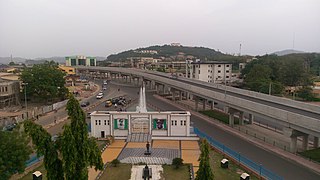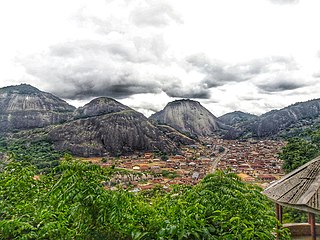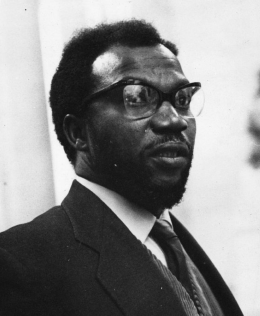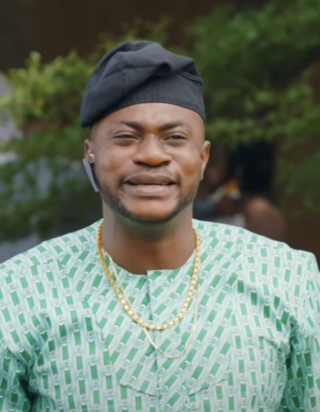
Photojournalism is journalism that uses images to tell a news story. It usually only refers to still images, but can also refer to video used in broadcast journalism. Photojournalism is distinguished from other close branches of photography by having a rigid ethical framework which demands an honest but impartial approach that tells a story in strictly journalistic terms. Photojournalists contribute to the news media, and help communities connect with one other. They must be well-informed and knowledgeable, and are able to deliver news in a creative manner that is both informative and entertaining.

Ado Ekiti is the capital city of Ekiti State, Nigeria. It is the headquarter of the Ekiti central senatorial district, southwest, Nigeria.

Ondo State is a state in southwestern Nigeria. It was created on 3 February 1976 from the former Western State. It borders Ekiti State to the north, Kogi State to the northeast for 45 km, Edo State to the east, Delta State to the southeast for 36 km, Ogun State to the southwest for 179 km, Osun State to the northwest for 77 km, and the Atlantic Ocean to the south. The state's capital is Akure, the former capital of the ancient Akure Kingdom. The State includes mangrove-swamp forest near the Bights of Benin.

The University of Lagos, popularly known as UNILAG, is a public research university located in Lagos, Nigeria and was founded in 1962. UNILAG is one of the first generation universities in Nigeria and is ranked among the top universities in the world in major education publications. The university presently has three campuses in the mainland of Lagos. Whereas two of its campuses are located at Yaba, it's college of medicine is located at Idi-Araba, Surulere. Its main campus is largely surrounded by the Lagos lagoon and has 802 acres of land. The University of Lagos currently admits over 9,000 undergraduate students annually and enrolls over 57,000 students.
John Olukayode Fayemi ; born 9 February 1965) is a Nigerian politician who served as governor of Ekiti State from 2018 to 2022. He previously served in office between 2010 and 2014 before losing re-election to Ayodele Fayose. He was also the Minister of Solid Minerals Development in President Muhammadu Buhari's cabinet from 11 November 2015 to 30 May 2018, when he resigned to contest for a second term as Governor of Ekiti State. He is the pioneer president of the Forum of Regions of Africa (FORAF) since 9 September 2022.

Odinigwe Benedict Chukwukadibia Enwonwu MBE, better known as Ben Enwonwu, was a Nigerian painter and sculptor. Arguably the most influential African artist of the 20th century, his pioneering career opened the way for the postcolonial proliferation and increased visibility of modern African art. He was one of the first African artists to win critical acclaim, having exhibited in august exhibition spaces in Europe and the United States and listed in international directories of contemporary art. Since 1950, Enwonwu was celebrated as "Africa's Greatest Artist" by the international media and his fame was used to enlist support for Black Nationalists movement all over the world. The Enwonwu crater on the planet Mercury is named in his honour.
Jacob Festus Adeniyi Ajayi, commonly known as J. F. Ade Ajayi, was a Nigerian historian and a member of the Ibadan school, a group of scholars interested in introducing African perspectives to African history and focusing on the internal historical forces that shaped African lives. Ade Ajayi favours the use of historical continuity more often than focusing on events only as powerful agents of change that can move the basic foundations of cultures and mould them into new ones. Instead, he sees many critical events in African life, sometimes as weathering episodes which still leave some parts of the core of Africans intact. He also employs a less passionate style in his works, especially in his early writings, using subtle criticism of controversial issues of the times.

Ed Kashi is an American photojournalist and member of VII Photo Agency based in the Greater New York area. Kashi's work spans from print photojournalism to experimental film. He is noted for documenting sociopolitical issues.

Makoko is an informal settlement across the 3rd Mainland Bridge located on the coast of mainland Lagos. A third of the community is built on stilts along the lagoon and the rest is on the land. The waterfront part of the community is largely harboured by the Egun people who migrated from Badagary and Republic of Benin and whose main occupation is fishing.
Babafemi Ojudu is a Nigerian journalist who was elected Senator for the Ekiti Central constituency of Ekiti State, Nigeria, in the April 2011 national elections. He ran on the Action Congress of Nigeria (ACN) platform.

LagosPhoto Festival is the first international art festival of photography in Nigeria, launched in October 2010. It is organised by the African Artists’ Foundation (AAF) as part of an ongoing project designed to use art in public spaces, as a medium for increasing societal awareness. The festival includes workshops and classes for professional artists, art fairs and indoor and outdoor exhibitions citywide. LagosPhoto is held annually and features emerging photographers alongside established photographers.

Odunlade Jonathan Adekola ; born 31 December 1976) is a Nigerian actor, singer, film-maker, film producer and film director. He gained popularity and was widely known for his lead role in Ishola Durojaye's 2003 movie, Asiri Gomina Wa, and has acted in many Nollywood movies since then. He is the founder and CEO of the Odunlade Adekola Film Production (OAFP).
Kelechi Amadi-Obi is a Nigerian creative photographer, painter, artist and the publisher of Mania Magazine. His work in photography and visual art has earned him international renown featuring in many international exhibitions including Snap Judgment: New Position in contemporary African Photography, International center of photography New York (2006) He has been described as one of Nigeria's groundbreaking celebrity photographers who has "helped put Nigerian photography on the world map.". Vogue calls him "a major force in the creative scene in Nigeria."
The Anglican Diocese of Lagos is one of 13 dioceses within the Anglican Province of Lagos, itself one of 14 provinces within the Church of Nigeria. The current bishop is Humphrey Bamisebi Olumakaiye who succeeded Ephraim Ademowo.
The 2007 Ekiti State gubernatorial election was the 3rd gubernatorial election of Ekiti State. Held on 14 April 2007, the People's Democratic Party nominee Olusegun Oni won the election, defeating Kayode Fayemi of the Action Congress of Nigeria.
Nengi Omuku is a Nigerian creative artist, sculptor and painter.
Photography in Nigeria began as a profession in the late nineteenth century, attracting practitioners from across West Africa. The professional prestige accorded to photography in Nigeria has led to the country being characterized as a 'photographic giant' in the region.
Adetona Omokanye is a Nigerian creative photographer. Born in Erin-Ile, Kwara State, Nigeria, he currently lives in Toronto, Canada, having moved there from Lagos, Nigeria in 2020. Omokanye has at different times worked on assignments and commissions for Bloomberg, Getty Images, World Food Programme, Eater, Global Citizen among others. His compelling works have earned him international renown and features in several exhibitions and media platforms across the globe.
Hope Oghenerukevbe Eghagha is a Nigerian professor of English Literature and Literary Analysis in the Faculty of Arts, University of Lagos, currently researching on dramatic theory and criticism. He is a playwright, poet, novelist, biographer and a columnist in The Guardian newspaper (Nigeria) editorial board. Through his weekly newspaper opinion articles, he explores complex challenges in Nigeria.











